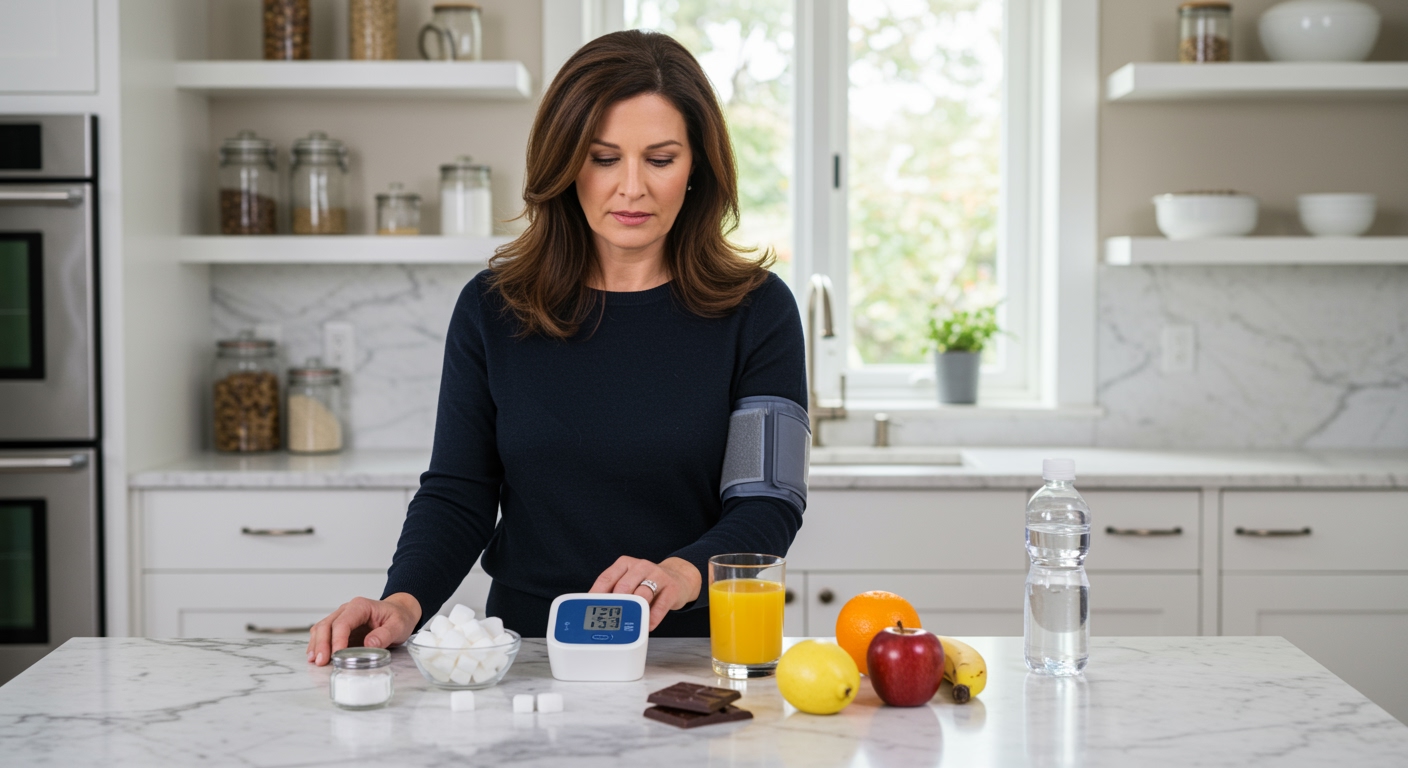✪ Key Takeaway: Sugar provides temporary blood pressure relief but worsens the condition long-term through blood sugar spikes and crashes.
Introduction
Your grandmother probably told you to eat something sweet when you felt dizzy from low blood pressure.
This advice seems logical because many people experience immediate relief after consuming sugar when their blood pressure drops suddenly.
Hi, I’m Abdur, your nutrition coach and today I’m going to explain why sugar might not be the solution you think it is for low blood pressure management.
What Happens When You Eat Sugar With Low Blood Pressure?
When you consume sugar during a low blood pressure episode, your body experiences a rapid increase in blood glucose levels.
This sudden spike triggers your pancreas to release insulin quickly, which can temporarily increase your heart rate and blood pressure.
The immediate relief you feel comes from this temporary cardiovascular response, not from actually fixing your low blood pressure problem.
Your blood vessels may also respond to the glucose surge by constricting slightly, which can raise your blood pressure readings temporarily.
However, this effect typically lasts only 30 to 60 minutes before your blood pressure returns to its previous low state.
The problem becomes worse when your blood sugar crashes after the initial spike, potentially making you feel even more lightheaded than before.
✪ Fact: Blood sugar spikes from sugar can temporarily raise blood pressure by 10-15 mmHg within 15 minutes.
Why Does Sugar Seem To Help Initially?
The reason sugar appears to help low blood pressure lies in understanding how your cardiovascular system responds to rapid changes in blood chemistry.
When glucose enters your bloodstream quickly, it increases blood volume temporarily as your body pulls water into your blood vessels to dilute the sugar concentration.
This increased blood volume can raise your blood pressure readings and make you feel less dizzy or faint for a short period.
Your nervous system also responds to the sugar rush by releasing stress hormones like adrenaline, which naturally increases your heart rate and blood pressure.
Many people mistake this temporary improvement for a real solution, leading them to reach for sugary foods every time their blood pressure drops.
The relief feels real because your symptoms do improve temporarily, but you are not addressing the underlying cause of your low blood pressure condition.
✪ Pro Tip: Track your blood pressure 2 hours after eating sugar to see the complete picture of its effects.
What Are The Long-Term Problems With Using Sugar?
Regular sugar consumption to manage low blood pressure creates a dangerous cycle that can worsen your condition over time.
Each time you consume sugar for blood pressure relief, you train your body to expect these glucose spikes, which can lead to insulin resistance.
Insulin resistance makes it harder for your body to regulate blood sugar levels naturally, leading to more frequent blood sugar crashes and associated blood pressure drops.
The repeated cycle of sugar highs and crashes can also stress your adrenal glands, which play a crucial role in maintaining healthy blood pressure.
Over time, this pattern can contribute to weight gain, which puts additional strain on your cardiovascular system and can actually lower your baseline blood pressure further.
Studies show that people who regularly use sugar to manage low blood pressure symptoms often develop more severe hypotensive episodes and require stronger medical interventions later.
✪ Note: Chronic sugar use for blood pressure can increase your risk of developing type 2 diabetes by 40%.
What Should You Do Instead Of Eating Sugar?
The most effective approach to managing low blood pressure involves addressing the root causes rather than masking symptoms with temporary fixes.
Increasing your salt intake moderately can help your body retain more fluid, which naturally raises blood pressure in a more sustainable way than sugar.
Drinking more water throughout the day helps maintain adequate blood volume, which is often the real issue behind low blood pressure episodes.
Eating smaller, more frequent meals with balanced protein and complex carbohydrates prevents the blood sugar swings that can trigger blood pressure drops.
Regular physical activity, especially exercises that strengthen your leg muscles, can improve blood circulation and help your body maintain better blood pressure naturally.
If you experience frequent low blood pressure episodes, working with a healthcare provider to identify underlying causes like dehydration, medication side effects, or hormonal imbalances is essential.
✪ Pro Tip: Add a pinch of sea salt to your water bottle to naturally support healthy blood pressure levels throughout the day.
The Bottom Line
Sugar provides only temporary relief for low blood pressure while creating long-term problems that can make your condition worse over time.
Quick fixes often become permanent problems when we ignore the root cause, and this principle applies perfectly to using sugar for blood pressure management.
I would love to hear about your experiences with managing low blood pressure naturally, so please share your questions or thoughts in the comments below.
References
At NutritionCrown, we use quality and credible sources to ensure our content is accurate and trustworthy. Below are the sources referenced in creating this article:
- Nutrisense: Can Low Blood Sugar Cause High Blood Pressure
- PMC: Blood Sugar and Blood Pressure Research
- Health Central: Can Blood Sugar Affect Blood Pressure
- CDC: Low Blood Sugar Hypoglycemia





